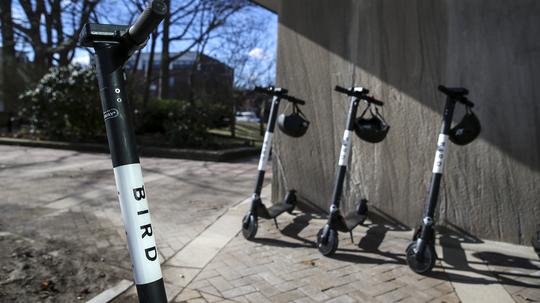
The coronavirus pandemic is reshaping travel patterns and changing how people use micro-mobility devices like the shared electric scooters that returned last week to the streets of Minneapolis and St. Paul.
Commuting is down and joyrides are up. Longer trips are replacing shorter scooter jaunts that might have been one leg in a multi-modal journey involving transit or ride sharing.
At least, that’s what scooter operators say they’re seeing in other cities. Scooter season in Minneapolis started two months later than it did in 2019, a delay at least partly due to the pandemic.
Two scooter companies — San Francisco-based Lyft Inc. and Santa Monica, California-based Bird Rides Inc. — launched July 16 in Minneapolis, where last year users racked up over 1 million rides. A day earlier, a third scooter company, Lime, owned by San Francisco-based Neutron Holdings Inc., deployed roughly 500 scooters in St. Paul, with Bird’s scooters set to join them as soon as the company finalized a license agreement with the city.
Blanca Laborde, a senior manager on Bird’s government partnerships team, said they are expecting a surge in the use of scooters and other micro-mobility devices during the pandemic. That’s in part because users are avoiding ride-sharing services and transit out of health concerns. (In the Twin Cities, Metro Transit is still asking riders to limit bus use to “essential trips.”)
“Micro-mobility has built-in social distancing,” Laborde said.
Data from Bird’s 60-plus markets shows trips are 50% longer than before the pandemic, she said. One in three Bird scooter rides since March was taken by a first-time user, and Laborde said 93% of those new users take a second ride, an increase in their pre-pandemic retention rate.
“That means people who are trying electric scooters for the very first time are quickly becoming repeat riders,” she said.
That’s positive news for Bird, which, like other micro-mobility companies, has been stung by the economic fallout from Covid-19. Bird laid off a third of its workforce this spring. Both Lyft and Lime cut more than one-eighth of their workforces earlier this year, with Lime also pulling scooters from 12 of the markets it had previously served, including Atlanta and Phoenix in the U.S.
Minneapolis has lined up an additional four scooter companies that would be allowed to deploy in the city in case either Lyft or Bird is unable to live up to its contract, which requires each of them to have 500 scooters on the streets by July 31. The city’s “two-plus-a-bench” strategy acknowledges the pandemic-related financial strain the micro-mobility companies are under.
Lime spokesperson Russell Murphy said the company left markets where its business was “unsustainable,” either due to low ridership or onerous local regulations. Overall, Murphy said, the company is operating in a “similar number” of markets as this time last year.
“We’re not worried about the business. We think the business is coming back very strongly from Covid,” he said.
Like Bird, Lime is seeing its users across the globe take scooters on longer, farther rides during the pandemic, even though Russel acknowledged the total number of scooter trips is “not hitting the peak highs of last summer.” And where those trips are starting and ending is also shifting.
With city centers emptied by pandemic-era work-from-home policies, Lime is seeing more use of its scooters in residential neighborhood settings outside of downtowns. Its trip data are also showing more rides that start and end in the same place — the telltale signature of a joyride.
JP Howlerda, Lime’s operations manager for St. Paul, said the company is changing its deployment strategy to match shifting use patterns. That means more scooters waiting for riders near parks and water.
“We want to be where people are, and people are in parks and in open air,” Howlerda said.








